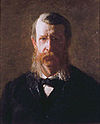
George Frederick Barker
Encyclopedia

United States
The United States of America is a federal constitutional republic comprising fifty states and a federal district...
physician
Physician
A physician is a health care provider who practices the profession of medicine, which is concerned with promoting, maintaining or restoring human health through the study, diagnosis, and treatment of disease, injury and other physical and mental impairments...
and scientist
Scientist
A scientist in a broad sense is one engaging in a systematic activity to acquire knowledge. In a more restricted sense, a scientist is an individual who uses the scientific method. The person may be an expert in one or more areas of science. This article focuses on the more restricted use of the word...
. He graduated at the Yale Scientific School
Sheffield Scientific School
Sheffield Scientific School was founded in 1847 as a school of Yale College in New Haven, Connecticut for instruction in science and engineering. Originally named the Yale Scientific School, it was renamed in 1861 in honor of Joseph E. Sheffield, the railroad executive. The school was...
in 1858. He was successively chemical assistant in Harvard Medical School
Harvard Medical School
Harvard Medical School is the graduate medical school of Harvard University. It is located in the Longwood Medical Area of the Mission Hill neighborhood of Boston, Massachusetts....
in 1858-59 and 1860–61, professor
Professor
A professor is a scholarly teacher; the precise meaning of the term varies by country. Literally, professor derives from Latin as a "person who professes" being usually an expert in arts or sciences; a teacher of high rank...
of chemistry
Chemistry
Chemistry is the science of matter, especially its chemical reactions, but also its composition, structure and properties. Chemistry is concerned with atoms and their interactions with other atoms, and particularly with the properties of chemical bonds....
and geology
Geology
Geology is the science comprising the study of solid Earth, the rocks of which it is composed, and the processes by which it evolves. Geology gives insight into the history of the Earth, as it provides the primary evidence for plate tectonics, the evolutionary history of life, and past climates...
in Wheaton (Ill.) College. In 1864 he became the Professor of Natural Science at the Western University of Pennsylvania, now known as the University of Pittsburgh
University of Pittsburgh
The University of Pittsburgh, commonly referred to as Pitt, is a state-related research university located in Pittsburgh, Pennsylvania, United States. Founded as Pittsburgh Academy in 1787 on what was then the American frontier, Pitt is one of the oldest continuously chartered institutions of...
, where he undertook experiments to produce electric light by passing the current through a resisting filament which he claimed was "the first steady electric light generated in Pittsburgh, if not in the country". He subsequently went to Yale as a professor of physiological chemistry
Physiological chemistry
Physiological chemistry is the chemistry of the organs and tissues of the body and of the various physiological processes incident to life. Physiological chemistry is essentially the precursor to modern biochemistry. In the nineteenth century, physiological chemistry dealt primarily with...
and toxicology
Toxicology
Toxicology is a branch of biology, chemistry, and medicine concerned with the study of the adverse effects of chemicals on living organisms...
, and later was a professor of physics
Physics
Physics is a natural science that involves the study of matter and its motion through spacetime, along with related concepts such as energy and force. More broadly, it is the general analysis of nature, conducted in order to understand how the universe behaves.Physics is one of the oldest academic...
at the University of Pennsylvania
University of Pennsylvania
The University of Pennsylvania is a private, Ivy League university located in Philadelphia, Pennsylvania, United States. Penn is the fourth-oldest institution of higher education in the United States,Penn is the fourth-oldest using the founding dates claimed by each institution...
, in 1879-1900, when he became emeritus
Emeritus
Emeritus is a post-positive adjective that is used to designate a retired professor, bishop, or other professional or as a title. The female equivalent emerita is also sometimes used.-History:...
professor. He served as president
President of the American Association for the Advancement of Science
The American Association for the Advancement of Science , founded in 1848, is the world's largest general scientific society. It serves 262 affiliated societies and academies of science and engineering, representing 10 million individuals worldwide...
of the American Association for the Advancement of Science
American Association for the Advancement of Science
The American Association for the Advancement of Science is an international non-profit organization with the stated goals of promoting cooperation among scientists, defending scientific freedom, encouraging scientific responsibility, and supporting scientific education and science outreach for the...
in 1879; president of the American Chemical Society
American Chemical Society
The American Chemical Society is a scientific society based in the United States that supports scientific inquiry in the field of chemistry. Founded in 1876 at New York University, the ACS currently has more than 161,000 members at all degree-levels and in all fields of chemistry, chemical...
; vice-president of the American Philosophical Society
American Philosophical Society
The American Philosophical Society, founded in 1743, and located in Philadelphia, Pa., is an eminent scholarly organization of international reputation, that promotes useful knowledge in the sciences and humanities through excellence in scholarly research, professional meetings, publications,...
for 10 years; a member of the United States Electrical Commission; and for several years an associate editor of the American Journal of Science
American Journal of Science
The American Journal of Science is the United States of America's longest-running scientific journal, having been published continuously since its conception in 1818 by Professor Benjamin Silliman, who edited and financed it himself...
. He lectured in many cities and wrote a Text-Book of Elementary Chemistry (1870); a Physics (1892); etc.

